Shakespeare wrote “Looking forward to hearing from you” exactly zero times.
Jane Austen? Never.
Hemingway would have deleted it and called it weak.
Yet somehow, this phrase colonized professional communication so completely that 9 out of 10 emails end with it or its cousins.
We’re all writing the same sentence.
But what else? Do you have other powerful alternatives to this phrase that don’t sound fancy or overused?
Let’s find out in this blog.
Today, we’ll discuss what “I look forward to hearing from you” means and when it works.
You’ll also learn 25+ professional alternatives that match different situations from urgent requests to casual check-ins.
Plus, the psychology behind email closings and why some get responses while others get ignored.
Let’s dive in.
Key Takeaways
- The phrase “I am looking forward to hearing from you” is a power signal. It’s a status marker that flows upward in professional hierarchies.
- This phrase fails in five situations: urgent emails, super formal ones, emotional messages, info-only updates, and after you’ve already chased someone.
- Period = formal and distant, comma = friendly, exclamation = excited.
- For urgency, deadlines, casual chats, or gratitude, pick a closing that better fits on that situation.
- Email ending affects responses.Weak closings get ignored. Strong closings get replies, action, or respect.
What “Looking Forward to Hearing from You” Really Means
“I look forward to hearing from you“ means you’re expecting a reply, but you’re phrasing it politely enough that it doesn’t sound like a demand.
Now if you had ever noticed, this phrase almost always travels upward from someone with less authority to someone with more:
- Applicant → Recruiter
- Freelancer → Client
- Junior Staff → External Partner
It flows in this direction because the sender can’t set deadlines or make demands.


Never Worry About AI Detecting Your Texts Again. Undetectable AI Can Help You:
- Make your AI assisted writing appear human-like.
- Bypass all major AI detection tools with just one click.
- Use AI safely and confidently in school and work.
When you lack authority, you can’t write “reply by Friday” or “I need your decision now.”
This is why you rarely see it used downward in hierarchy. A manager doesn’t write this to their assistant. A client doesn’t need it with their vendor.
Now, let’s explore some different and common ways of conveying the same meaning.
Good Option: I look forward to hearing from you.
→ Confident. Balanced. Creates expectation without demanding.
Not Recommended: I hope to hear from you.
→ Passive. Uncertain. You’ve surrendered control of the timeline.
Bad Option: Please reply soon.
→ Too direct. Sounds pushy, especially to someone with higher status.
When It’s Appropriate to Use “Looking Forward to Hearing from You”
This phrase works best when you need something from someone but can’t demand it directly.
Let’s see when this sentence works best:
- Job Applications & Interviews
In the hiring context, this closing line carries authority without arrogance.
- Application Example: Thank you for considering my application. I look forward to hearing from you regarding the next steps.
- Post-Interview Example: I appreciate the opportunity to interview. Looking forward to hearing back from you soon.
- Professional & Client Communication
In external business exchanges, it keeps tone professional yet approachable.
- Ideal for proposals, project pitches, and client follow-ups.
- Example: Please let me know your thoughts on the proposal. I look forward to hearing from you.
- Networking & Introductions
Used in initial outreach (e.g., LinkedIn or investor emails), it softens the ask and sets the tone for follow-up.
- Example: It was great connecting with you. Looking forward to hearing from you about potential collaboration.
- Internal Collaboration & Customer Service
Even within organizations, this phrase clarifies expectation while maintaining politeness.
- Team Input Example: I’d appreciate your feedback on this by the end of week. Looking forward to hearing from you.
- Customer Support Example: Please let me know how you intend to resolve this matter. I look forward to hearing from you.
However, there are some situations where this phrase loses impact. Or worse, sends the wrong signal in certain situations.
- Time-Sensitive or Urgent Requests
❌ I look forward to hearing from you.
✅ Please respond by [date] so we can move forward.
- Highly Formal or Legal Correspondence
In legal, executive, or official board communication, this phrase reads as too casual.
Better options:
- Respectfully,
- Thank you for your consideration.
- Emotionally Heavy or Negative Emails
When delivering criticism, bad news, or rejection, anticipating a reply feels off-key. It can come across as detached or insincere.
Instead, close with empathy or acknowledgment, e.g.,
- Thank you for your understanding.
- Redundant or Informational Exchanges
If no reply is needed. For example, an FYI or update email.
❌ Looking forward to hearing from you.
✅ Thanks for your time.
- After Repeated Follow-Ups
Overusing this phrase can shift from polite → passive-aggressive. When you’ve already nudged multiple times, it begins to sound like:
- I’m still waiting — what’s taking so long?
In such cases, be direct:
- Could you please confirm if you’ve received this?
Stop letting overused phrases dilute your message.
Choose the right closing every time, whether it’s a job application, client pitch, or internal request.
With our Undetectable AI’s Smart Applier or Cover Letter Generator, you’ll craft sign-offs that get replies, make people notice you, and save you from endless follow-ups.
Don’t wait, make your emails work for you.
Better Alternatives to “Looking Forward to Hearing from You”
Using the same closing line in every email is like wearing the same outfit to every event. But you won’t do that.
Because you’ve got these alternate options to choose from based on different scenarios.
If you’re searching for another way to say looking forward to hearing from you, here are some excellent options.
- The Formal & Professional Alternatives
When you need to maintain a high level of professionalism, your closing should reinforce respect and clarity.
Good Choices:
- Best regards
- Sincerely
- Kind regards
- Respectfully
If you want to keep a tone of professional enthusiasm:
- I’m eagerly awaiting your response.
Avoid overly casual closings like “Talk soon,” which can feel careless in formal contexts.
- The Urgent & Time-Sensitive Alternatives
When you need a fast response, ditch the polite vagueness. Be direct about timing while staying professional.
Better Options:
- Thank you for your timely response.
- I appreciate your quick response.
- Please review and confirm by 3 PM Tuesday.
You can also use this phrase with caution.
- Your prompt response would be appreciated.
This can sound demanding if used upward (e.g., with a manager or client).
- Casual & Friendly Alternatives
With established relationships and internal teams, drop the formality. These alternatives maintain warmth without unnecessary stiffness.
These are great looking forward to hearing from you synonym options for informal contexts.
Examples:
- Keep me posted (ideal for ongoing projects).
- We’ll talk soon.
- I can’t wait to hear from you.
- Always happy to hear from you.
- The “Thanks in Advance” Warning
The phrase “Thanks in advance” (TIA) is a bit risky because it assumes compliance before the person has agreed.
It’s essentially saying “You’re going to do this, so I’m thanking you now.” That presumption can backfire.
Use it only when:
- You have authority over the recipient
- The task is clearly part of their job duties
- The relationship can withstand potential friction
For most situations, stick with alternatives that request rather than assume.
Examples of “Looking Forward to Hearing from You” in Action
Let’s see how this phrase performs in different scenarios.
A. Job Application Examples
Example 1: Cover Letter
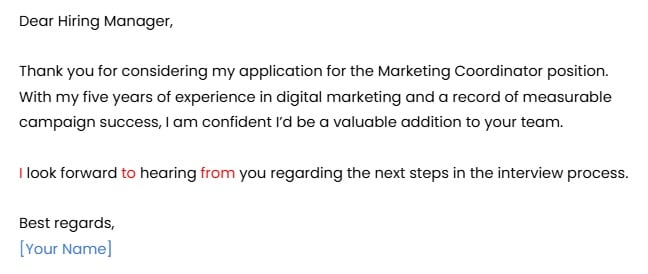
Example 2: Post-Interview Follow-Up
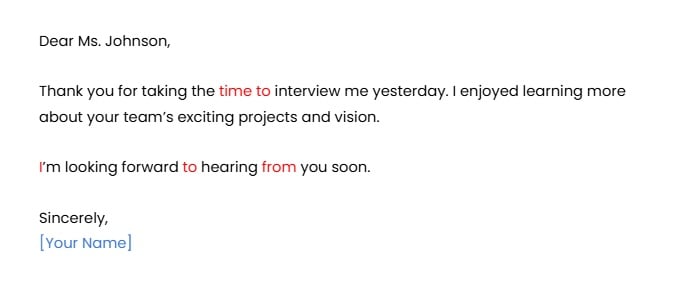
B. Client Communication Examples
Example 3: Project Proposal
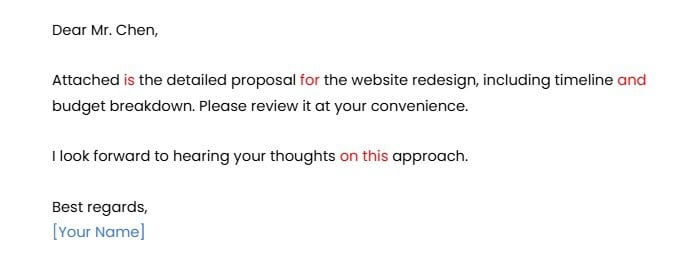
Example 4: Follow-Up on Pending Decision
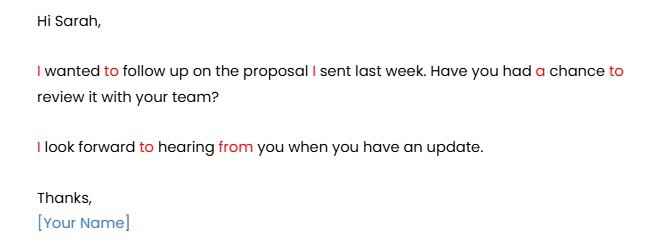
C. Customer Service Example
Example 5: Issue Resolution
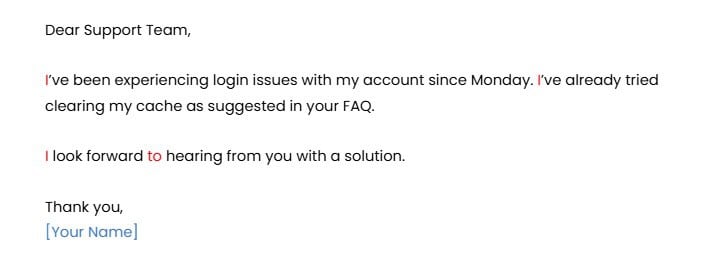
D. Internal/Team Communication Example
Example 6: Colleague Request
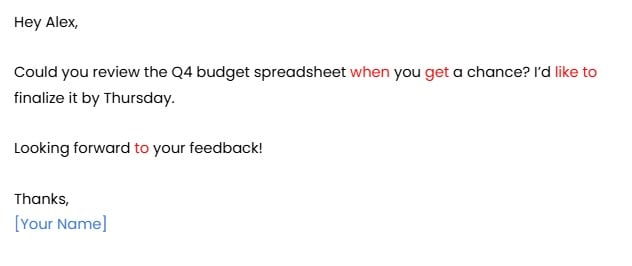
How Tone Changes Meaning
The phrase itself is neutral. What changes its tone and therefore, its impact. Here are the three invisible levers:
- Lexical & Structural Adjustments
The formality shift:
→ I look forward to hearing from you = formal, distant, polished.
→ Looking forward to hearing from you = softer, more personal.
→ I look very much forward to hearing from you = over-eager (avoid in high-power-distance settings).
- Punctuation Mastery
| Punctuation | Tone Effect | Example | Use When |
| Period (.) | Neutral, closed, slightly cold | Looking forward to hearing from you. | For formal correspondence |
| Comma (,) | Smooth, connected, natural flow | Looking forward to hearing from you, | For business-casual tone |
| Exclamation (!) | Energetic, enthusiastic | Looking forward to hearing from you! | For friendly or informal messages |
| Multiple !!! / CAPS | Desperation or aggression | LOOKING FORWARD TO HEARING FROM YOU!!! | Never in professional settings |
- Word Choice
Formal Alternatives (another way to say looking forward to hearing from you):
- I await your response. → Authoritative, impersonal.
- Your feedback would be appreciated. → Neutral, diplomatic.
Casual Alternatives:
- Hope to hear back soon. → Friendly, light.
- Can’t wait to hear from you. → Informal enthusiasm.
Action-Based Alternatives:
- Please confirm by Friday. → Clarity + urgency.
- Let me know your decision. → Direct, strong leadership tone.
- Context-Driven Tone Shifts
| Relationship Type | Tone | Example |
| New Contact | Formal, respectful | I look forward to hearing from you at your earliest convenience. |
| Established Peer | Casual, familiar | Looking forward to your thoughts on this! |
| Hierarchical Upward | Polite, deferential | I appreciate your time and consideration. |
| Team Member | Direct but friendly | Please confirm when reviewed — looking forward to your input. |
You’ve seen how the same phrase can feel formal, friendly, or over-eager depending on wording, punctuation, and context.
Don’t leave it to chance. Use Writing Style Replicator to craft email closings that perfectly match your tone, whether formal, casual, or persuasive.
Stop sending generic emails and start getting replies that move things forward.
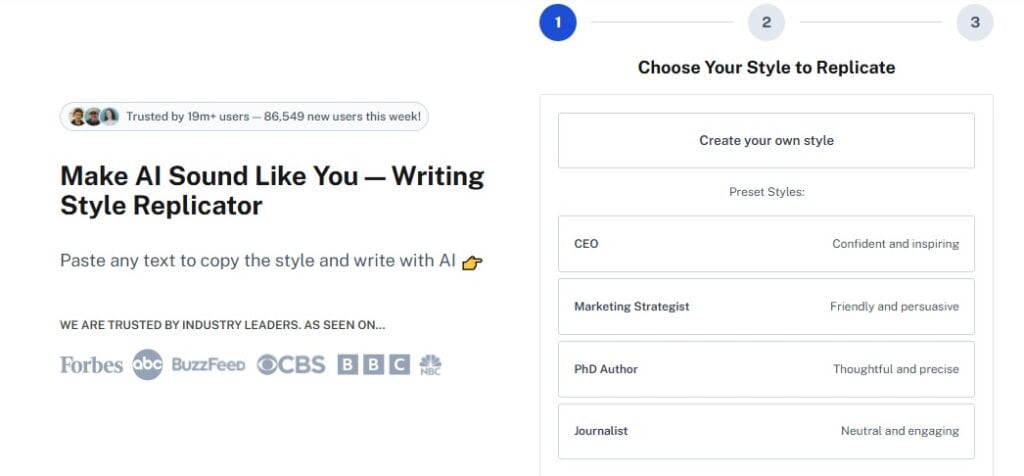
Before hitting send, run your message through the AI Checker to make sure your phrasing sounds naturally human and professional.
It reviews your email for tone, clarity, and flow, helping you avoid that “AI-written” stiffness while keeping your message authentic and polished.
Best Practices for Closing Professional Emails
The closing of your email sets the tone for how recipients remember you.
Get it right, and you create momentum. Get it wrong, and even a well-written email falls flat.
Here are the three non-negotiable rules for closing emails professionally in any situation.
Rule 1: Match Tone to Content
Your closing must align with everything that came before it. A formal content needs formal closing. Casual content allows casual closing. Don’t mix them.
Tone mismatch:
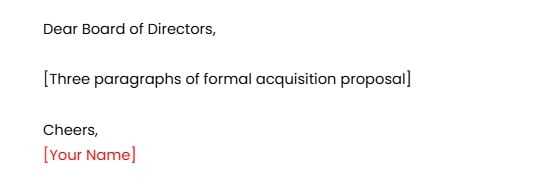
→ “Cheers” is too casual for a formal business proposal. It undermines the seriousness of your content.
Proper alignment:
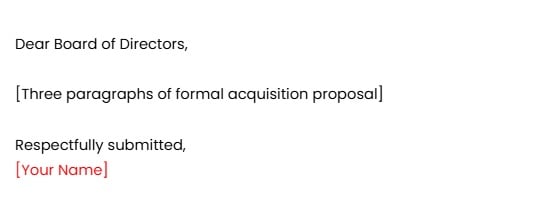
→ The formal closing matches the formal content. Everything feels consistent.
Rule 2: Consider Your Relationship with the Recipient
The person you’re emailing determines how much formality you need.
Don’t use the same closing for everyone. Your CEO and your work buddy shouldn’t receive identically formatted emails.
First email to potential client:
Thank you for your time. I am looking forward to hearing from you.
Best regards,
[Your Name]
→ Professional distance. Respectful formality.
Fifth email to colleague you work with daily:
Sounds good! Talk soon.
[Your Name]
→ Casual and quick. Matches established rapport.
Rule 3: Keep It Brief and Error-Free
Effective closings are short. Typically, they’re one to three words. Anything longer starts to feel like you’re overthinking it.
✓ Clean and simple:
- Best regards,
- Thank you,
- Sincerely,
- Best,
✗ Overthought and clunky:
- With warmest regards and best wishes for your continued success,
- Thank you so very much for taking the time to consider this,
Capitalization rule: Only capitalize the first word of your closing. The rest stays lowercase.
Before we move ahead, here’s the complete email closing structure. A professional closing is a three-part system that works together:
[Closing line/Call to action]
[Sign-off phrase]
[Your signature]
How to End Emails Without Saying “Looking Forward to Hearing from You”

Different situations call for different types of closings. Let’s explore a few of them.
These are all excellent alternatives if you’re wondering another way to say looking forward to hearing from you.
A. Direct Request Endings
Use when you need specific action or feedback from the recipient. These are precise, actionable, and reduce ambiguity.
| Purpose | Example Phrases |
| Confirm receipt | Please confirm receipt of this email |
| Request feedback | Could you provide feedback by [date]? |
| Approval request | Please review and approve by end of week |
| Specific question | Can you let me know [specific question]? |
B. Gratitude-Based Endings
Use when the goal is to show appreciation or acknowledge someone’s effort. These closings are polite and build goodwill.
| Purpose | Example Phrases |
| General thanks | Thank you for your time |
| Assistance | I appreciate your assistance |
| Help or effort | Many thanks for your help |
| Consideration | Thank you for your consideration |
C. Collaborative Endings
Use when you want to signal teamwork or future interaction. These are positive and relationship-focused.
| Purpose | Example Phrases |
| Upcoming discussion | Looking forward to our discussion |
| Joint work | Excited to work together on this |
| Scheduling meeting | Let’s connect soon |
| Appreciation of teamwork | Great working with you |
D. Open-Ended Endings
Use when you want to invite questions or further conversation without imposing a timeline.
| Purpose | Example Phrases |
| Questions | Let me know if you have any questions |
| Open communication | Feel free to reach out |
| Further discussion | Happy to discuss further |
| Clarifications | Happy to clarify anything further |
E. Deadline-Setting Endings
Use when you need a response by a specific date or intend to proceed if no input is given.
| Purpose | Example Phrases |
| Conditional action | If I don’t hear back by Friday, I’ll proceed with Plan A |
| Implicit deadline | Unless I hear otherwise, I’ll move forward on Monday |
| Direct deadline | Please respond by [date] to avoid delays |
F. Situational Endings
Tailor your closing depending on the context of the email.
| Situation | Example Phrases |
| Complaints | We are committed to finding a quick and efficient solution |
| Follow-ups | Could I get feedback by Friday? |
| Networking | Have a great day/week/weekend |
| Team emails | As ever (works with ongoing relationships) |
G. Sign-Offs That Work Universally
Sign-offs communicate tone and level of formality. Choose based on your relationship with the recipient.
| Type | Examples |
| Traditional/Formal | Sincerely, Best regards, Kind regards, Warm regards |
| Modern Professional | Best, All the best |
| Casual Professional | Cheers, Take care |
If you’re looking to enhance your email’s final impression, Undetectable AI’s AI Chat provides a sophisticated way to find creative and human-sounding variations for common professional sign-offs.
Instead of falling back on tired clichés, you can use this tool to generate natural alternatives that drive replies and resonate more effectively with a human audience.
Test our AI Detector and Humanizer with the widget below!
Conclusion
Languages evolve by killing off dead phrases.
“I remain your obedient servant” died in the 1900s.
“I have the honour to be” disappeared by 1950.
“I look forward to hearing from you” is overdue for extinction… not because it’s wrong, but because it’s exhausting.
Every phrase has a lifecycle: fresh → useful → overused → meaningless.
The problem is that exhausted phrases stop getting noticed and stop getting results.
Now, you have 25+ alternatives in various lifecycle stages, from fresh and actionable to warm and relationship-building.
The smart move is to pick the ones still alive, ones that make your emails land, get read, and get replies.
Don’t cling to the dead, language rewards the bold.
Keep your writing fresh, engaging, and authentically human with Undetectable AI, the ultimate tool for refining tone and improving clarity in your professional communication.
